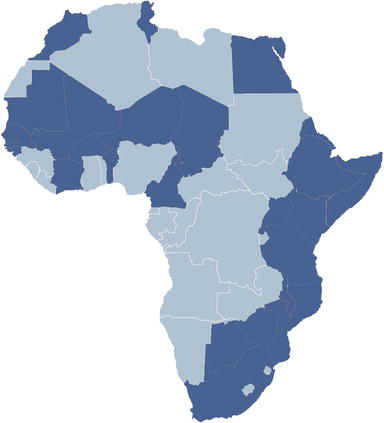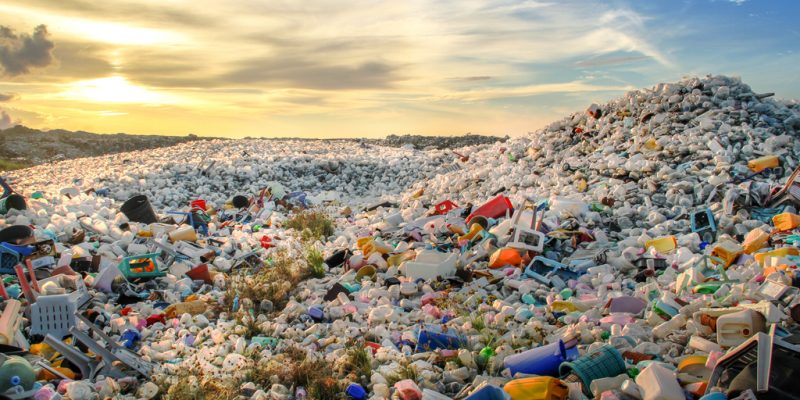Introduction
Waste generation could be said to be as old as human existence. Man’s survival requires that resources within the environment are exploited for human needs and the sustenance of life. In doing so, a number of waste materials are generated. Waste in itself refers to any substance which is no longer suitable for intended use[1]. Over the course of human existence, the type of waste generated have evolved from mostly organic material to significant amounts of nondegradable materials. The World Bank[2] estimates that in 2016, the world’s cities jointly generated about 2.01 billion tons of solid waste which amounts to about 0.74kg daily per capita. As populations grow, this number is expected to continue to rise. In fact, estimates suggest that by 2050, at least some 3.4 billion tons, a 70% increase from what was obtainable in 2016[3].
Plastics among other non-degradable makes up a significant chunk of these waste. Generally, the amount of waste produced is influenced by a nations’ level of technological advancement, economic activity, consumption, and population growth (United States Environmental Protection Agency (USEPA)[4]. Developed societies, like the USA and UK produce significantly large amounts of municipal solid waste (e.g., food wastes, packaged goods, disposable goods, used electronics) as well as commercial and industrial wastes (e.g., demolition debris, incineration residues, refinery sludges)[5]. Waste have generally far reaching consequences for life and the environment. Hence, the way these wastes are managed is of great importance. Even though the developed nations generate relatively more waste than the developing world, the reasonably developed waste management systems of the former allows for better mitigation of the waste hazards. In Nigeria, a major problem is the menace of polythene bags and other plastics that litter virtually every street without any significant system in place to tackle the problem. In this article, we will briefly highlight the current waste situation in Nigeria, the problems and how we feel this may be properly handled.
The Waste Situation
Of the 2.01 billion tonnes of solid waste generated globally in 2016[6], Nigeria generates an estimated 32 million tonnes (32 billion kilogram) of solid waste yearly; one of the highest in Africa, and a significant part being organic waste. The waste stream in Africa has a significantly high organic content compared to the global average. This is quite typical of a developing nation. However, one major waste stream of concern is the plastic waste. Global estimates show that about 10 million units of plastic bottles are discarded every 10 mins amounting to over 500 billion units per annum as well as another 5 trillion plastic bags annually with the oceans believed to receive at least 8 million tonnes of plastics annually[7]. Estimates show that an estimated 13% of the municipal solid waste generated in sub-Saharan Africa is plastic (Figure 1), the bulk of which is also dumped on the openly dumped on the land[8]. More so, of the 32 million tonnes of solid waste generated in Nigeria per annum, about 2.5 million tonnes (2.5 billion kilogram) is made up of plastics[9]. With this estimate, Nigeria is among the top 20 nations that contribute 83 per cent of the entire volume of land-based plastic waste that end up in the oceans. Estimates also suggest that about 200,000 tonnes (200 million kilogram) of discarded plastic waste from land-based sources in Nigeria end up in the Atlantic Ocean annually. Worrying about this is that about Fifty percent (50%) of these plastic and packaging waste are single-use disposable products which may not be reusable without further processing. It is quite common to see plastic bottles and containers being thrown on the ground, thrust out of vehicles, hipped around narrow passages or blown away by wind which litter the surroundings[10]. These huge amounts of plastic wastes indiscriminately discarded within our environment without any recourse to standard waste management practices have significant consequences for the sustainability of the environment and should thus be a thing of concern.

Figure 1: Municipal Solid Waste composition in sub-Saharan Africa and global; Source: Godfrey et. Al., 2020
The Risk
Generally, the amount of waste produced is highly determined by the level of technology, economic activity, consumption patterns and population of a particular area. Even though the developed nations generate relatively more solid waste than the developing world, the ability of the latter to reasonably manage the waste creates relatively less problems. Waste, when left unattended for a long time constitutes serious health hazard, causes offensive odour, pollutes underground water sources and decreases aesthetic appeal of the environment[11]. Globally, plastics and associated waste are estimated to be responsible for the death of between 20 to 30 percent of aquatic life. Some forecast suggest that there may be more plastics than fishes in the ocean by the year 2050 if the current rate of plastic waste generation is not stemmed[12]. This portends danger for aquatic life and even man. For instance, estimates by the African Development Bank (2019) show that over 100,000 aquatic animals die annually due to plastic pollution while plastic residues contaminate about 83% of underground water sources. Of plastics, while 83 percent of underground portable water sources are contaminated with plastics residues.
The disposal of plastics into oceans and rivers also “leads to suffocation and entanglement of aquatic organisms like fishes, seabirds, turtles, mussels, crustaceans and sea mammals, while plastic ingestion could be so deadly” [13]. In addition, the indiscriminate dumping of especially in urban centers serves as breeding ground for several disease vectors and can result in cholera, malaria, typhoid fever, dengue fever and Zika. Ground water around dump sites are also at risk of contamination while the heaps of littered plastic debris put a dent on the aesthetic appeal of the environment. Moreover, a common site in Nigeria is the blockade of water ways and drainages with these plastics and polythene bags thereby resulting in flooding, environmental pollution and the attendant damage to various public and private facilities[14]. With Nigerian population currently at about 200 million and still projected to rise to about 260 million by 2030 (United Nations, 2021), this implies that waste generation will continue to increase and so will be the attendant risks. This notwithstanding, these challenges can be curtailed significantly with proper waste management[15].
Management System
Estimates show that over 90% of the waste generated in low-income countries end up in unregulated dumps or are openly burned (The World Bank, 2022). In Africa for instance, even though between 80% to 90% of the waste generated in Africa are recyclable, only about four percent pass through recycling. In Africa, over 90% of the waste are disposed in both regulated and unregulated open dump sites[16] thus becoming an environmental disaster. Generally, only about 12% of plastic waste gets recycled in Nigeria. The remaining over 80% of these are disposed of either in landfills and on designated or undesignated open dump sites[17]. Some of these dumped openly are later burned leading to release of toxic gases into the atmosphere. This is a common practice in virtually every city in Nigeria as there are no significant strong regulations against such practice.
A 2020 UNEP report indicates that 29 African countries have implemented some form of partial or complete bans on the use of plastic bags either at the local or national level. From figure 2, we see that no such regulation exist in Nigeria [18]. Thus while public outcry against the use of plastics is increasing and may lead to further actions against plastics and other materials, Nigeria, the giant of Africa, which should lead the way may seem to be trailing behind (UNIDO, 2021).

Fig 2: African showing nations that have instituted bans on plastic bags (in dark blue); Source: Godfrey et. Al. 2020
In Nigeria, the funds, infrastructure, trained labor, and political willpower for any meaningful, robust waste management system are poor, insufficient, or lacking. 2020). For instance, Dunbili and Henderson (2020) posited that over half of the waste generated in Lagos “is left uncollected from the streets and the various locations due to the inadequacy and inefficiency of the waste management system’’. In most Nigerian cities, the use of open dumpsites is pervasive.
More so, Dunbili and Henderson (2020) estimates that only about 56% of the populace are served by the FCT Waste collection agency. More so, Nnaji[19] posited that about 80% of Nigerian cities are not properly served by waste collection services and the people are thus allowed to discard off as they deem fit. This situation is certainly not good for the nation and needs to be looked at. Across the nation, the usual general sanitations of the past where communities engage in general clean up is no longer being observed in majority of the states. All these exacerbates the already precarious situation we have.
The Problem We See
The challenge with the waste management practices in many African nations especially Nigeria, is the adoption of the “top-bottom” approach in waste management where government is responsible for most of the waste management. Government seem to have virtually monopolized the management of waste and citizens’ responsibility is not being fully utilized. Bulk of the work which should lie in the hands of citizens and private institutions have been largely managed by government. Consequently, in a midst of scarce resources, “insufficiently trained workforce and/or inadequate waste management facilities”[20]. Besides, there’s little political will to introduce regulations or at least enforce those already in place. This has thus perpetuated the carefree (I don care) attitude of Nigerians towards indiscriminate disposal of plastic waste virtually everywhere they find suitable.
While state environmental agencies manage waste collection directly or through private contractors, the process of collection for reuse or recycling has been majorly left in the hands of the informal sector dominated by scavengers who collect waste and take to designated places for processing. There appears to be no robust, well-coordinated management system that includes the citizens. The poor investment in the waste collection sector by the private sector also contributes in compounding the problem. These weak waste collection systems combined with open dumping and burning of waste continuously present economic, social and environmental impacts that have far reaching consequences.
The Three Rs of Waste Management
The three solid waste management strategies are the 3Rs (Reduce, Reuse and Recycling) . This is a very effective way of controlling plastic waste in circulation. By reducing the use of plastics and making adjustments to how consumer products are packaged, this strategy can go a long way in tackling the plastic waste problem. Moreover, instead of just throwing plastics bags and bottles, households can improvise how to sanitize and reuse same for the benefit of the environment. This will however mostly come with some form of regulation or levies that can force companies to make adjustments to their packaging as well as discourage people from indiscriminate disposal of waste. Perhaps, the most important component in waste management especially as it concerns plastics is recycling. This has to do with reprocessing used plastics into conditions for them to be reused as originally intended or transforming them into other products. Lagos state, which suffers from perennial floods occasioned by blockade of drainages by plastics has been at the forefront of putting recycling systems in place with 50 recycling plant across the state. Other states include Kaduna, Kano, Edo and the FCT. This notwithstanding, the current top-bottom system has proven quite inadequate and probably needs overhauling.
What We Suggest
Bottom-Top Approach
As presented above, governments of other African nations have taken practical steps in putting bans and special taxes for use of certain materials especially plastics. Unfortunately, there is no current regulation restricting the use of certain plastics in Nigeria even though a number of African countries like Kenya and South Africa have already taken the lead (UNIDO, 2020). Unsurprisingly, over the years, the Nigerian public have developed a high level of poor sanitation habits. We need to reverse this thought process to allow people to be more conscious about the environment. The Bottom-Top approach reflects the need for restructuring the waste collection system to allow for citizens to take responsibility for the waste they produce rather than the current government monopolized nature we have. The Nigerian must realize that the bulk responsibility for waste management lies with the citizen.
The government, through the National Orientation Agency as well as other related institutions within the states have a lot of work to do in this regard. People must be encouraged to adjust consumption patterns. The idea of the three Rs must sink in. They must be able to seek to reduce the use of plastics by reusing the materials possible and properly disposing the refuse. Citizens must understand the consequences of indiscriminate, carefree handling of waste and become more conscious to the problems that accompanies such actions.
A case for Household waste segregation
In adopting the bottom-top approach highlighted above, we make a case for the aggressive introduction of legislation for waste segregation practices among Nigerian households and institutions. Waste segregation refers to the act of separating waste into various categories using different marked containers. In advanced nations, this technique has been well developed such that various color codes exist for different kinds of waste depending on the environment. Figure 3 shows an example of a color-coded waste system for households in Switzerland. In many of these places, these kind of waste bins exist not just at peoples’ residences but even on the streets so that people can easily dispose of waste even while on transit.
Household waste segregation as a strategy of waste management is an effective and sustainable way of beginning the journey of a proper waste management since it handles waste from the source. In Nigeria unfortunately, there is hardly any such system as waste are just chunked up together and carried away without any care of the degree of hazard of the content. Even government officials designated dumps have no provision for waste segregation and such waste is evacuated as a single unit. In making a case for citizen participation, a case in point is that of Morit International School in Lagos which opens a “plastics bank account” for students so they can “deposit” plastics and in turn get a school fees subsidy. The school in-turn works with recycling plants to transform the plastic waste for further use. It is ones believe that the government can adopt this method which sees student fees subsidized by the submission of plastic waste to the management. The idea is for government to utilize their government school students as a means of mopping up the tremendous amounts of plastic wastes that litter our environment. With this idea, households will no longer dispose off plastics but may gather them and submit them to schools for subsidy of various fees at school or for them to be rewarded with textbooks and other learning resources. This we believe can in the long-run take care of the littering of drainages and surroundings and protecting the various aquatic life that is at the receiving end of the disposition of these plastics.
CONCLUSION
There is virtually no robust system for waste management in the Nigerian society today. The top-bottom approach that sees government being almost solely responsible for management has proven to be inadequate. There’s need for the government to show some will power in tackling the plastic waste crisis to guarantee a more sustainable environment. We encourage a shift toward a bottom-top approach that will see citizens significantly involved in the waste they generate. With significant enlightenment, creation of some form of incentive for citizens coupled with enforcement of legislation, the common practice of throwing away used PET bottles and various packages on the street without any consideration whatsoever of the attendant consequences will be significantly contained. Moreover, the activation of local level monitoring system for waste disposal may likely help stamp in a pro-environmental behaviour among the citizens thus guaranteeing us all a safer environment.
[1]Thisday, June 12 2021. Paying School Fees from Plastic Wastes. https://www.thisdaylive.com/index.php/2021/06/03/paying-school-fees-from-plastic-wastes/
[2]Emeka Dumbili, Lesley Henderson, Chapter 22 – The challenge of plastic pollution in Nigeria, Ed(s): Trevor M. Letcher, Plastic Waste and Recycling, Academic Press, 2020, Pages 569-583, https://doi.org/10.1016/B978-0-12-817880-5.00022-0.
[3]Kehinde, O., Ramonu, O. J., Babaremu, K. O., & Justin, L. D. (2020). Plastic wastes: environmental hazard and instrument for wealth creation in Nigeria. Heliyon, 6(10), e05131. https://doi.org/10.1016/j.heliyon.2020.e05131
[4]https://www.statista.com/statistics/1264873/distribution-of-waste-disposal-in-nigeria/
[5]Adekola, P.O., Iyalomhe, F.O., Paczoski (2021). A. et al. Public perception and awareness of waste management from Benin City. Sci Rep 11, 306 https://doi.org/10.1038/s41598-020-79688-y
[6]Kalyanasundaram, M., Sabde, Y., Annerstedt, K.S. et al. (2021). Effects of improved information and volunteer support on segregation of solid waste at the household level in urban settings in Madhya Pradesh, India (I-MISS): protocol of a cluster randomized controlled trial. BMC Public Health 21, 694 https://doi.org/10.1186/s12889-021-10693-0
[7]The World Bank (2022). Solid waste management. https://www.worldbank.org/en/topic/urbandevelopment/brief/solid-waste-management
[8]https://sisu.ut.ee/waste/book/11-definition-and-classification-waste
[9]https://www.unido.org/news/japan-and-unido-sign-agreement-sustainable-plastic-value-chains-project-nigeria
[10] https://www.sciencedirect.com/science/article/pii/S2405844020319745
[11]United States Environmental Protection Agency. Waste: What are the trends in wastes and their effects on human health and the environment? https://www.epa.gov/report-environment/wastes
[12]https://www.sciencedirect.com/science/article/pii/S2405844020319745
[13]https://www.sciencedirect.com/science/article/pii/S2405844020319745
[14]Godfrey, L., Ahmed, M. T. , Gebremedhin, K. G. , Katima, J. H. , Oelofse, S., Osibanjo, O., Richter, U. H. , & Yonli, A. H. (2019). Solid Waste Management in Africa: Governance Failure or Development Opportunity?. In (Ed.), Regional Development in Africa. IntechOpen. https://doi.org/10.5772/intechopen.86974
[15]Hanafi A. Punch Newspapers (2018). Plastic Pollution: Nigeria‘s Untapped ‗waste Wealth‘ Fuels Environmental Disaster; pp. 18–19.https://punchng.com/plastic-pollution-nigerias-untapped-waste-wealth-fuels-environmental-disaster/
[16]Godfrey, L., Ahmed, M. T. , Gebremedhin, K. G. , Katima, J. H. , Oelofse, S., Osibanjo, O., Richter, U. H. , & Yonli, A. H. (2019). Solid Waste Management in Africa: Governance Failure or Development Opportunity?. In (Ed.), Regional Development in Africa. IntechOpen. https://doi.org/10.5772/intechopen.86974
[17]https://www.sciencedirect.com/science/article/pii/S2405844020319745
[18]https://www.sciencedirect.com/science/article/pii/S2405844020319745
[19]Nnaji, C. C. (2014). Status of municipal solid waste generation and disposal in Nigeria. Manag Environ Qual Int J;26(1):53e71.
[20] https://www.researchgate.net/publication/338805077_The_Challenge_of_Plastic_Pollution_in_Nigeria


0 Comments